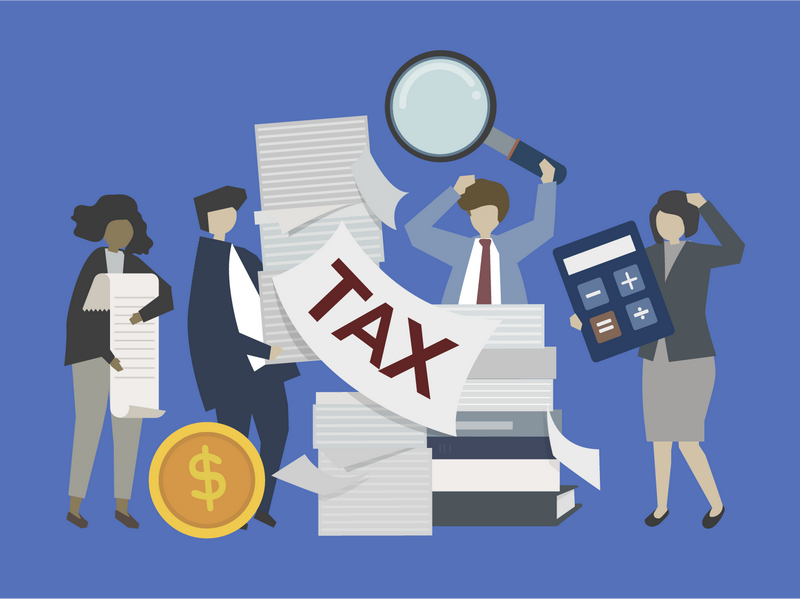Introduction
As per letter of Special Secretary and Member, CBIC dated 10th February, 2020 Interest amounting to ₹45,996 crores remains unpaid to the government on account of delayed payment of tax and urged field formation to expedite recovery of such Interest. This communication and subsequent collection efforts mainly on part of Center team (CGST department) has generated lot of interest of tax payers in this matter and doubts have been raised by trade as to whether the interest has to be paid on the gross tax liability or only on the net cash liability? In this write-up an effort has been made to put up at one place possible pointers to this perplexing question.
Landmark Judgment
Hon’ble Supreme court in Pratibha Processors v/s UOI 1996(11) SCC 101 has held as under
“Interest is compensatory character and is imposed on an assessee who has withheld payment of any tax as and when it is due and payable. The levy of Interest is geared to actual tax withheld and the extent of delay in paying the tax on due date.”
Legal Provisions in CGST Act
Section 50(1) of CGST Act reads as under:
“Every person who is liable to pay tax in accordance with the provisions of this Act or the rules made thereunder, but fails to pay the tax or any part thereof to the Government within the period prescribed, shall for the period for which the tax or any part thereof remains unpaid, pay, on his own, interest at such rate, not exceeding eighteen per cent., as may be notified by the Government on the recommendations of the Council.”
Above section makes it very clear that interest is payable on the unpaid amount of tax payable or part thereof. Tax payable has not been defined in the Act. Mumbai High Court in Tata Engineering & Locomotive Co Ltd vs State Of Maharashtra and Others in [1992] 85 STC 507 has ruled that in the context of Bombay Sales Tax Act, 1956 that “Tax payable” refers to net tax payable after adjustment of applicable set off etc. This view was re-affirmed by apex court in Associated Cement Co. 1981 48 STC 466 SC. Even in common parlance payable refers to net amount payable derived after necessary adjustment. Balance in Input Tax Credit (ITC) ledger logically represents advance payment to government. This common sense view have been affirmed many times by Apex court
Further Section 50(2) of CGST Act reads as under;
The interest under sub-section (1) shall be calculated, in such manner as may be prescribed, from the day succeeding the day on which such tax was due to be paid
Section 2(87) of the CGST Act defines term “Prescribed”
Prescribed to mean prescribed by Rules made under this Act on the recommendations of the Council.
Vide Notification No. 13/2017 – Central Tax dated 28th June 2017, Interest rate of 18% p.a was prescribed for the purpose of section 50(1) of the CGST Act.
The GST Council in its 31st meeting held on 22nd December, 2018 gave in principle approval to the amendment of section 50 of the CGST Act to provide that interest should be charged only on the net tax liability of the taxpayer, after taking into account the admissible input tax credit, i.e., interest would be leviable only on the amount payable through the electronic cash ledger
Following Proviso was added to Section 50(1) vide CGST Amendment Act, 2019 however till date this amendment is yet to be notified.
“Provided that the interest on tax payable in respect of supplies made during a tax period and declared in the return for the said period furnished after the due date in accordance with the provisions of section 39, except where such return is furnished after commencement of any proceedings under section 73 or section 74 in respect of the said period, shall be levied on that portion of the tax that is paid by debiting the electronic cash ledger”
After going through applicable legal provision let’s understand perplexing issues as under:
Perplexing issue # 1
Whether Interest is chargeable under section 50(1) for so called delayed payment of Interest?
In terms of section 50(2) of the CGST Act (supra), Government shall prescribe by way of rules manner of calculation of Interest for delayed payment. However, till date such manner is not prescribed. Apex court decisions in Govind Saran Ganga Saran v. CST ( AIR 1985 SC 1041) , CIT v. B.C. Srinivasa Shetty (1981) ( 128 ITR 294) & Delhi High court judgment in the case of Suresh Kumar Bansal Vs. Union of India [2016-TIOL-1077-HC-DEL-ST] suggest a view that failure to prescribe method of calculation of interest by way of suitable rule as mandated by section 50(2), No interest is collectible under section 50(1) of the CGST act
Perplexing issue # 2
If at all Interest is chargeable, is it chargeable on Gross Liability or Net Liability?
This question in today’s context is worth many billons. CBIC seems to have taken view that till the time proviso to section 50(1) is notified Interest is chargeable on Gross Liability.
However, Madras High Court in Refex Industries Limited reported in [2020] 114 taxmann.com 447 (Madras) has held as under:
“The specific question for resolution before me is as to whether in a case such as the present, where credit is due to an assessee, payment by way of adjustment can still be termed ‘belated’ or ‘delayed’. The use of the word ‘delayed’ connotes a situation of deprival, where the State has been deprived of the funds representing tax component till such time the Return is filed accompanied by the remittance of tax. The availability of ITC runs counter to this, as it connotes the enrichment of the State, to this extent. Thus, Section 50 which is specifically intended to apply to a state of deprival cannot apply in a situation where the State is possessed of sufficient funds to the credit of the assessee. In my considered view, the proper application of Section 50 is one where interest is levied on a belated cash payment but not on ITC available all the while with the Department to the credit of the assessee. The latter being available with the Department is, in my view, neither belated nor delayed”
Perplexing issue # 3
Whether addition of Proviso to section 50(1) is to be applied prospectively or retrospectively?
CBIC once again has taken a view that the said proviso will take effect prospectively from date to be notified. Hon’ble Madras high court in Refex Industries Limited (supra) has taken a view that said proviso seeks to correct an anomaly in the provision as it existed prior to such insertion and therefore held as clarificatory and operative retrospectively.”
Honble Apex court in CIT v. Vatika Township Private Limited [TS-573-SC-2014-O] has succinctly explained has explained cardinal principal of law on Prospective vs. Retrospective amendment as under:
Where a benefit is conferred by a legislation, the rule against the retrospective construction is different. If a legislation are confers a benefit on some persons but without inflicting a corresponding detriment on some other person or on the public generally, and where to confer such benefit appears to have been the legislator object, then the presumption would be that such a legislation, giving it a purposive construction, would warrant it to be given at retrospective effect. This exactly is the justification to treat procedural provisions as retrospective. Where a law is enacted for the benefit of community as a whole, even in the absence of a provision the statute may be held to be retrospective in nature.
Perplexing Issue # 4
Is there any judgment of other high courts contrary to the Madras High court judgment (supra)
High Court Of Telangana in the case of Megha Engineering & Infrastructures Ltd. v. Commissioner of Central Tax [2019] 104 taxmann.com 393 (TELANGANA) in its judgement dated 18th April 2019 has dismissed writ petition and held that interest is payable on Gross basis.
However it will be worthwhile to note that at the time of pronouncement of said judgment the recommendations of the GST Council as per 31st meeting were only paper. Subsequently on 1st August 2019 The Finance Act 2019 is enacted. Taking note of this enactment Hon’ble Telangana High court has also accepted the review petition and granted interim stay on its earlier order. Accordingly taking a view that Megha Engineering Judgment and Refex Industries Limited judgement are contrary may not be a correct view. Further Madras High court while delivering judgment in Refex Industries Limited has considered decision of Megha Engineering and changes in circumstances.
Perplexing Issue # 5
Is there any judgment of other high courts which supports view of Madras High Court expressed in Refex Industries Limited?
Recent trend suggest that judiciary is taking a view that Interest is payable only on cash liability. Summary of the such judgments are as under :
Delhi High Court in case of M/S Landmark Lifestyle v/s Union of India & Others reported in [2019] 105 taxmann.com 354 (Delhi)., has granted stay on recovery of interest amount on gross GST Liability where there was delay in filing of GST return.
Gujarat High Court in case of Amar Cars Private Limited Vs Union of India in (R/Special Civil Application No. 4025 of 2020) has directed the department to not to take any coercive steps for the purpose of recovery of the interest.
Even in case of Megha Engineering & Infrastructures Ltd. v. Commissioner of Central Tax subsequent review petition is accepted and interim stay is granted on earlier order by Telangana High Court.
Perplexing Issue # 6
Whether Department can resort to direct recovery without following principle of Natural justice as suggested in letter written by Special Secretary and Member, CBIC?
Special secretary letter suggest that relying of section 75(12) of the CGST Act unpaid Interest can be collected following provision of section 79 of CGST Act. However many high court on the Issue of Interest have not accepted this view and uphold the principal of natural justice. Relevant extract of such judgments are extracted as under:
Jharkhand High Court in Godavari Commodities Ltd vs UOI reported in [2019(12) TMI 275]:
Hon’ble court observed that even otherwise, if any penal action is taken against the petitioner, irrespective of the fact whether there is provision under the Act or not, the minimum requirement is that the principles of natural justice must be followed.
Further court held that the petitioner shall be given an opportunity of being heard by the adjudicating authority, who shall give a hearing to the petitioner, whether the petitioner was liable to pay the short paid interest amount or not. In case, upon adjudication, it is found that the petitioner was not liable to make the payment of interest short paid, the said amount shall be refunded to the petitioner with statutory interest thereon.
Karnataka High court in LC Infra Projects Private limited vs Union of India reported in [2019(8) TMI 84) has held as under:
The issuance of Show Cause notice is sine qua non to proceed with the recovery of interest payable thereon under Section 50 of the Act and penalty leviable under the provisions of the Act or the Rules. Undisputedly, the interest payable under Section 50 of the Act has been determined by the third respondent Authority without issuing Show Cause Notice, which is in breach of principles of natural justice. It is trite of law that any order passed by the quasi-judicial authorities in contravention of the principles of natural justice, cannot be sustained. Similarly, after determination of the interest liable to be paid by the petitioner, no notice has been issued before attaching the bank account of the petitioner. There is a lapse on the part of the third respondent Authority.
The notion of the third respondent Authority that Section 75(12) of the Act empowers the authorities to proceed with recovery without issuing Show Cause Notice is only misconceived. The said Section is applicable only to the self-assessment made by the assessee and not to quantification or determination made by the Authority.
Madras HC in Daejung Moparts Pvt Ltd reported in 2020 (2) TMI 668 held as under :
Therefore, in my considered view, though the liability fastened on the assessee to pay interest is an automatic liability, quantification of such liability certainly needs an arithmetic exercise after considering the objections if any, raised by the assessee. It is to be noted that the term “automatic” does not mean or to be construed as excluding “the arithmetic exercise”. In other words, though liability to pay interest arises under section 50 of the said Act, it does not mean that fixing the quantum of such liability can be unilateral, especially, when the assessee disputes the quantum as well as the period of liability. Therefore, in my considered view, though the liability of interest under section 50 is automatic, quantification of such liability shall have to be made by doing the arithmetic exercise, after considering the objections of the assessee.
Perplexing Issue # 7
Whether payment of Tax is a pre-condition in law for filing GSTR-3B and if not whether GST portal allows filing of GSTR-3B without payment of self-assessed Tax?
Harmononious reading of GST law suggest that it is legally possible to furnish return without full payment of self-assessed tax. However, law as imposed by GSTN does not allow filing of GSTR-3B unless self-assessed tax is paid in full. Due to this restriction imposed by portal, on due date tax payer can’t adjust his availed ITC and balance in cash ledger against liability. This position is also accepted by GST council in minutes of 31st GST council meeting. Acknowledging this difficulty in following 2(Two) judgments high courts have taken out of box view to help tax payer.
OCTAGON COMMUNICATIONS PVT LTD. VERSUS UNION OF INDIA [2019] 105 taxmann.com 262 (Gujarat)
Petitioner has submitted that there is no condition for making payment of tax as a pre-condition for filing return of Form GSTR-3B however the online portal does not allow filing of returns without payment of tax liability admitted and such restriction is contrary to legal provisions. Further petitioner argued that such denial would deprive him from availment of ITC. As an ad-interim relief in this matter Hon’ble Gujarat High Court has permitted manual filing of GSTR-3B
Madras High Court in M/s Asean Aromatics Private Limited Vs ACGST reported in 2019 (3) TMI 269 has allowed Tax payer to pay pending GST dues in installments.
What lies next?
Legally as well logically demand of interest on gross basis may not be accepted by Trade and Industry. Further above reported judgments have embolden tax payer’s chance of arguing their case successfully before judicial authorities. Both Revenue and Tax payers may try every opportunity to safeguard their goals but It would not be out of context to mention that handholding by law makers and law implementers at such a crucial juncture of GST implementation will certainly help India in achieving target of 5 (Five) Trillion economy and any adverse view may prove to be last knell for already troubled trade community. On a optimistic note, signing off with quote
“Picture abhi baaki hai mere dost….”



